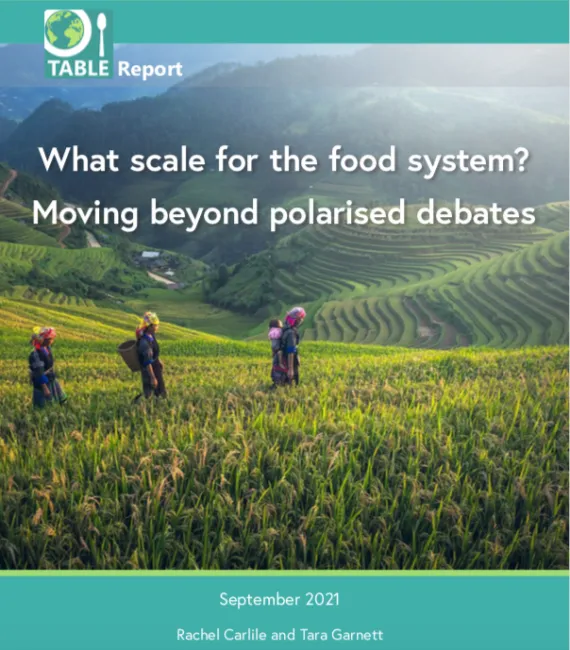This report shares our reflections on TABLE’s most recent project of work – a series of dialogues and discussions with food systems stakeholders, focused on the theme of ‘scale’ in the food system.
Report Summary
This report shares our reflections on TABLE’s most recent project of work – a series of dialogues and discussions with food systems stakeholders, focused on the theme of ‘scale’ in the food system.
For more information, events, explainers and podcast episodes on the topic, visit the scale webpage and listen to the TABLE podcast.
Areas of agreement: key messages shared by our speakers
- Assumptions need to be challenged: Key terms such as ‘smallholder’ encompass multiple realities, and assumptions about food systems (e.g. that small farms have lower yields; local food systems are more democratic) may not be correct or may be locally specific.
- The local-global binary is unhelpful: Food systems encompass multiple, interconnected scales. Therefore, problems found in one place may be resolved elsewhere, or by processes seemingly unrelated to food systems outcomes.
- Diversity of scales is essential: There is no single ‘ideal’ scale for the food system; it is important to maintain a diversity of scales and ensure that they harmonise rather than compete. Currently, the large-scale or global (e.g. transnational agribusiness; global trade; large farms) tends to dominate, and displace or overwhelm alternative scales of action.
- The state plays a key role: National governments need to play a key role in food systems, in order to encourage sustainable farming practices, to improve the resilience of food systems, and to ensure that markets and the private sector contribute to food security, equity and sustainability.
Areas of contention
Each speaker offered nuanced reflections, and no one advanced the more extreme stances common in polarised debates. Nonetheless, certain topics proved more divisive, in particular, the future of smallholder farming, the benefits of global trade and the governance of food systems.
What factors influence opinions on contentious topics?
Certain underlying factors seemed to influence opinions on these more contentious topics.
- Perceptions of reform: Some speakers were optimistic about the possibility of generating reform within the system, whereas others were more sceptical and promoted alternatives to dominant scales of activity.
- Different values and priorities: All speakers highlighted the importance of food security, sustainability, social equity and resilience; however, speakers prioritised and understood these goals differently, and disagreed on the scope and pace of change, and the specific interventions deemed necessary.
- Disciplinary and professional background: Speakers’ disciplinary or professional background seemed to affect their interpretation of history, the scale of focus they adopted when considering food systems change, and, in turn, their opinions on contentious topics.
- Personal experiences: shaped speakers’ aesthetic preferences and expectations for global interactions.
Suggested citation:
Carlile, R., & Garnett, T. (September 2021). What scale for the food system? Moving beyond polarised debates. TABLE Reports. TABLE, University of Oxford, Swedish University of Agricultural Sciences and Wageningen University & Research.




